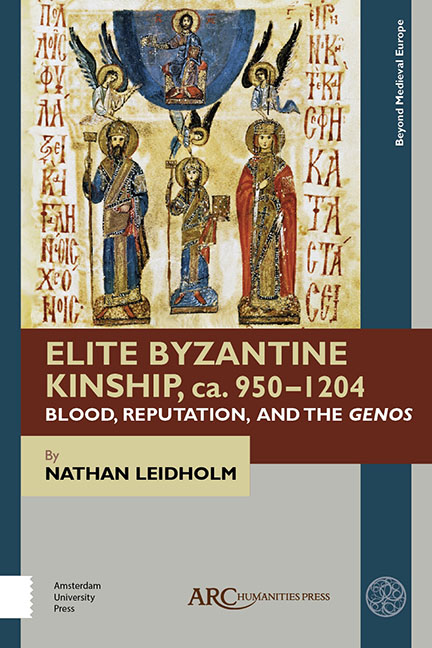Book contents
- Fronrtmatter
- Contents
- List of Abbreviations
- Abbreviation
- Acknowledgements
- Introduction
- Chapter 1 Defining “the Family” in Byzantine Sources and the Modern Historiography
- Chapter 2 The Language of Kinship
- Chapter 3 Marriage Impediments and the Concept of Family
- Chapter 4 Interrogating Consanguinity in a Byzantine Context
- Chapter 5 Family Names and the Politics of Reputation
- Chapter 6 Kinship and Political Developments of the Eleventh and Twelfth Centuries
- Conclusion
- Select Bibliography
- Index
Chapter 3 - Marriage Impediments and the Concept of Family
Published online by Cambridge University Press: 20 November 2020
- Fronrtmatter
- Contents
- List of Abbreviations
- Abbreviation
- Acknowledgements
- Introduction
- Chapter 1 Defining “the Family” in Byzantine Sources and the Modern Historiography
- Chapter 2 The Language of Kinship
- Chapter 3 Marriage Impediments and the Concept of Family
- Chapter 4 Interrogating Consanguinity in a Byzantine Context
- Chapter 5 Family Names and the Politics of Reputation
- Chapter 6 Kinship and Political Developments of the Eleventh and Twelfth Centuries
- Conclusion
- Select Bibliography
- Index
Summary
Ἐν τοῖς γάμοις οὐ μόνον τὸ ἐπιτϵτραμμένον, ἀƛƛὰ καὶ τὸ ϵὐπρϵπὲς καὶ σϵμνὸν καὶ φύσϵι δίκαιον ζητοῦμϵν.
In marriages, we seek not only what is allowed [by law], but also that which is seemly, honourable, and just according to nature.
Basilika 28.5.7THE BYZANTINE GENOS as kin group, comprising exclusively an individual's consanguineous family, corresponded to what the legal sources refer to as “natural kinship” (physike syggeneia). Impediments to marriage based upon consanguinity, which effectively determined the limits of legally recognized “natural kinship,” may thus be understood as equally determining the structural limits of the genos, at least from the perspective of civil and canon law. The civil laws governing inheritance rights, the other major area in which Byzantine law took an interest in the consanguineous family, remained largely stable from the tenth through the twelfth century, setting the outer limit of relatives of the deceased who might hope to claim some portion of his/ her estate at the seventh degree of consanguinity (children of one's second cousin). This fact would come to have a significant impact on debates over the extension of marriage impediments and, thus, of the genos.
With the exception of eunuchs, some slaves, and those destined from an early age for the religious life, every Byzantine would expect to participate in the institution of marriage regardless of wealth or social standing, making marriage a near-universal rite of passage in the Byzantine world. The wedding ceremony and celebration, in addition to one's choice of husband or wife, involved not only the individual, but each spouse's extended family, and its importance both to the individual and to their kinsmen is reflected in a wide range of sources from all periods. This near-universal significance is reflected in the language and arguments used by jurists and clergy in the eleventh through thirteenth centuries, as they grappled with issues that they understood to be fundamental to human kinship.
Marriage impediments, especially as they pertained to consanguineous relations, give the clearest indication of Byzantine thinking regarding the outer limits of the singular, “natural” family and, thus, of the genos.
- Type
- Chapter
- Information
- Elite Byzantine Kinship, ca. 950–1204Blood, Reputation, and the Genos, pp. 63 - 86Publisher: Amsterdam University PressPrint publication year: 2019

